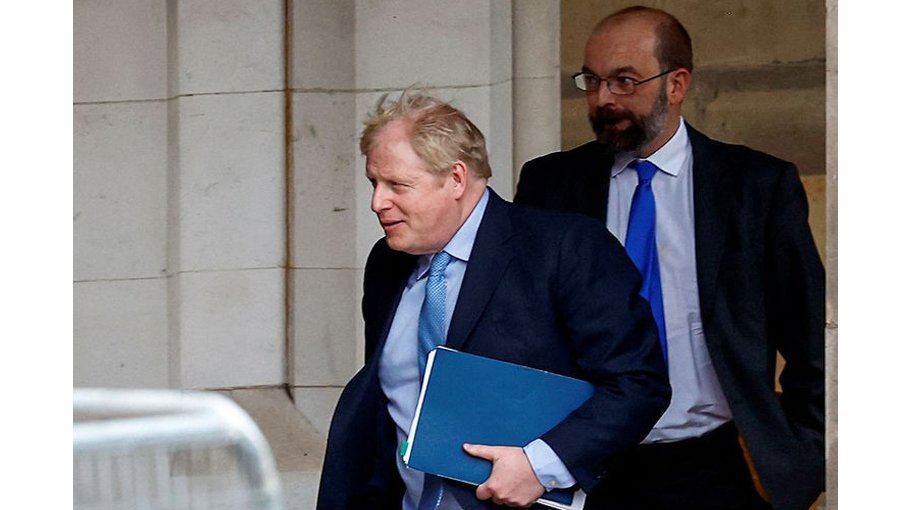
Each week, the Current Affairs team of the British Broadcasting Corporation, visit a different town or city up and down the four corners of the United Kingdom, for its weekly Question Time programme.
The concept of the programme is pretty straightforward. An audience of a hundred or so local people are invited to a town hall or similar small theatre, where they can ask questions of a panel of five people.
Usually there is a Conservative minister of some sort, a Labour opposition shadow minister, someone from the business community, plus a couple of others who are well versed, usually academics and journalists.
Last week, Question Time came from Stoke on Trent, a town more famous for its pottery and brickmaking industries that drove much of the Industrial Revolution. It’s a town of old factories set beside canals, railways and viaducts.
France explodes in retirement age protests
The programme aired on the same day as Boris Johnson, the former UK Prime Minister, appeared before a House of Commons committee to explain his actions during the coronavirus lockdown and, specifically, whether he deliberately misled parliament during those weeks of denials of social gatherings.
Stoke on Trent is a town that was, up to Johnson’s ascent to the Conservative leadership and his promise to “get Brexit done”, very much in the Labour column.
For pretty much a century, Stoke voters returned Labour MPs. But not under Boris. It was one of those “red wall” seats that fell under his charm, charisma, and categorical promise that he would get Brexit over the line and would break with the European Union, come hell or high water.
We all know that Boris did indeed do that, even if his form of “oven ready” Brexit left Northern Ireland inside the EU’s customs zone after he simply decided that Scotland, England and Wales would go it alone, with his Irish flank being left to fend for itself.
Falling support for Johnson
And that unfinished Brexit business has led to all sorts of political tensions that have, sadly, also resulted in a resurgence in community tensions in the fragile peace process of Northern Ireland.
But back in Stoke, the finer points of the Northern Ireland protocol were lost as it was lost in the blue of coronavirus, lockdowns, and simply trying to get through the unprecedented social, economic and public health measures brought about by the pandemic.
Back to Question Time. The first question asked by a member of the public, no doubt the questions are vetted and scripted by producers beforehand, came from a woman who asked the panel that, given Boris’s sweaty and highly awkward — my words, not the questioner — appearance before the committee, was Johnson finished?
All agreed. But more importantly, the same question was then put to the entire audience in a show of hands. Not a single one was raised in his support. While by no means scientific, the straw poll is an indication of just how far he has fallen.
And the audience also were equally damning when asked whether they saw any way back for him down the road. In essence, this cross-section of red wall voters had made their minds up. His explanation simply wasn’t credible. And they had enough of him.
Brexit hasn’t worked
By all accounts, the sentiments are echoed across most corners of Great Britain, having listened to phone-in news programmes and the like.
But as Boris was giving his testimony, the session was interrupted for a vote on the so-called “Windsor Framework” — the deal hammered out by Prime Minister Rishi Sunak and Brussels to ease tensions over trade to Northern Ireland, and reverse the worst elements of Johnson’s deal.
As predicted, the hardline Democratic Unionist party MPs from Northern Ireland voted against the deal. Most tellingly, however, the hardline Brexiteers who had caused so much trouble for Theresa May in her attempts to reach a reasonable Brexit deal, seem to have faded away.
They were, of course, led by Johnson when he was a backbench MP, and they remained loyal to him throughout, barfing and slapping like trained seals as he denied time and time again that there were parties at a time when British people were forbidden from socialising or even attending funerals of those who had died from Covid-19.
“If I was accused of lawbreaking, and I had to give undertakings to the House of Commons…I’d want the advice of a lawyer.”
“The question is, why didn’t you take proper advice?”
When the division bells sounded, there were just a score or so who still backed Boris. Or, more importantly, backed the notion of a hard and uncompromising approach to dealing with Brussels when it comes to their version of Brexit.
The vote was certainly good news for Sunak, a decent man who is trying to make the most of a bad situation he inherited from Johnson and the brief interregnum of Liz Truss — remember her?
It shows that there is a new pragmatism in the Conservative ranks, one that has forsaken the heady jingoism Johnson offered in taking on Brussels and getting Brexit done.
That Brexit hasn’t worked. The British economy has tanked lower and harder than its counterparts across G7. And if there is to be any hope of salvaging even a mere hundred Tory seats come the next general election, now is the time to switch to common sense and pragmatism from Boris and Brexiteering.
That’s good news for everyone, whether that be Stoke on Trent, Stoke Newington, Scotland or Southend.
Now, if only the DUP could see the writing on the wall, forsake their hardline thinking, and accept the reality that the people of Northern Ireland deserve a power-sharing government, things would be a lot better all around. Sadly, there’s little chance of that happening anytime soon.
 Weekly Bangla Mirror | Bangla Mirror, Bangladeshi news in UK, bangla mirror news
Weekly Bangla Mirror | Bangla Mirror, Bangladeshi news in UK, bangla mirror news







